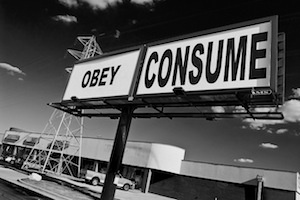Point: Our unconscious drives are exploited, but we have a means to fight!
Shopping is out of our control! I am wary of the consumer culture at the heart of this leviathan that is capitalism. Although the benefits gained should not be understated, it has outgrown our capacity to tame it. Marketing and sales techniques often exhibit a greater understanding of human behaviour than we do ourselves. If we don’t take some responsibility for our habits, they’ll be used against us.
- We are open to manipulation
As our species evolved, traits emerged that provided advantages in a changing environment. Understanding of these has opened many doors, including that of manipulation. Our very nature can be exploited by those with sufficient knowledge.
Advertising and brand promotion are everywhere! Our cultures promote the consumer lifestyle, meaning alternatives become very difficult. We are primed by our environment to consume.
Scarcity bias (an unconscious behaviour) is exploited to encourage impulse-buying.
Advantage can be taken of through unconscious rules of thumb (heuristics), used to make snap decisions. Knowing this, retailers sell in bulk or find ways to create the illusion of a good deal.
- It’s easy to spend money
The pleasure kick from receiving new things can form lifelong habits in children, seeking novelty in an item rather than intrinsic value.
We feel rich when buying expensive things. Also, making a difficult decision can yield pleasurable results. I can buy something I don’t need and still feel good, because serotonin is released. If I choose not to, I feel good about my self-control and save for more important things. Either way, it feels like the choice was mine to make.
Touching objects increases likelihood of buying; a property ‘instinct’.
Diderot effect – buying one luxury item seeds desire for more to uphold the standard.
 The hidden cost of value-seeking (Pchelin & Howell 2014) shows how people inaccurately forecast the economic benefits of life experience. We are inclined to choose material goods over opportunities for increased well-being, because it seems a better use of money.
The hidden cost of value-seeking (Pchelin & Howell 2014) shows how people inaccurately forecast the economic benefits of life experience. We are inclined to choose material goods over opportunities for increased well-being, because it seems a better use of money.
Recently, however, this trend is being upended. People are spending more in pubs, restaurants and theatres, while less on vehicles and appliances or in department stores.
- “The customer is always right…”
With the Internet, much has changed. Consumers increasingly distrust brands and make decisions based on what others are buying. Changes like this cause shifts in the advertising landscape.
We are dependent on society, but we have the power to shape it with our actions:
weighing unnecessary versus optimal spending; buying online, limiting temptation and saving money; cancelling e-subscriptions; selecting for quality, then putting to use or lending to others; waiting until the impulse passes and reconsidering; being grateful for the blessings in our life.
People could avoid products that use plastic packaging. We can force market evolution; competition insists upon flexibility.
But is all that necessary?
We often chose to buy products that are unhealthy, unhelpful, and promote exploitation of people and the planet. As consumers we have a responsibility to buy consciously. The world we pass on to posterity can be improved, and we have the tools to do so. The Stoics of ancient Greece understood the wisdom of limiting our desires. By doing so we are better able to appreciate what we have.
